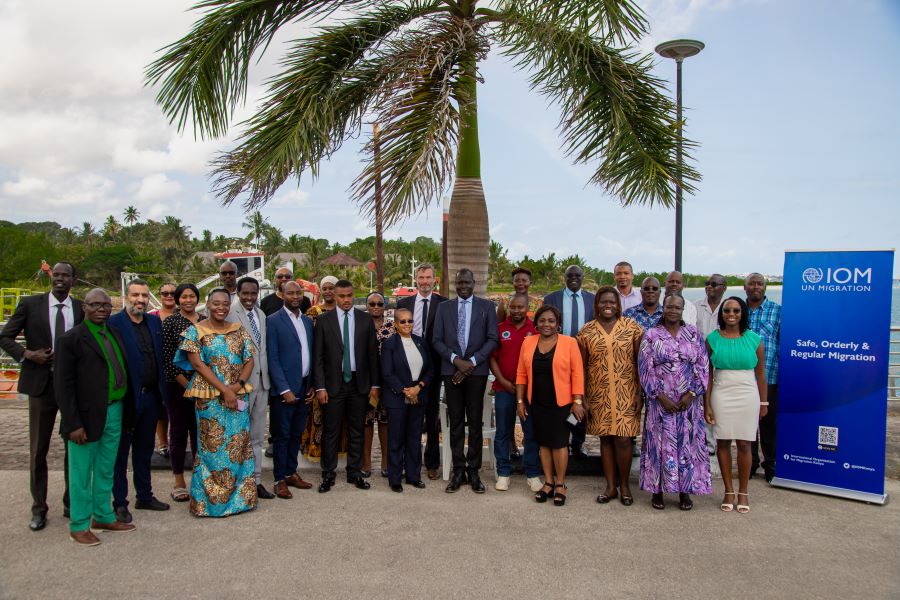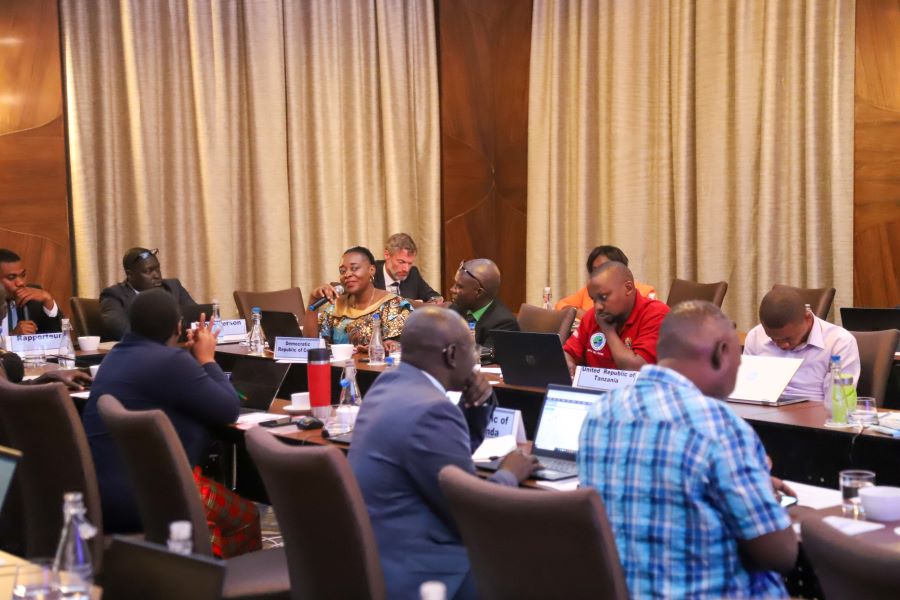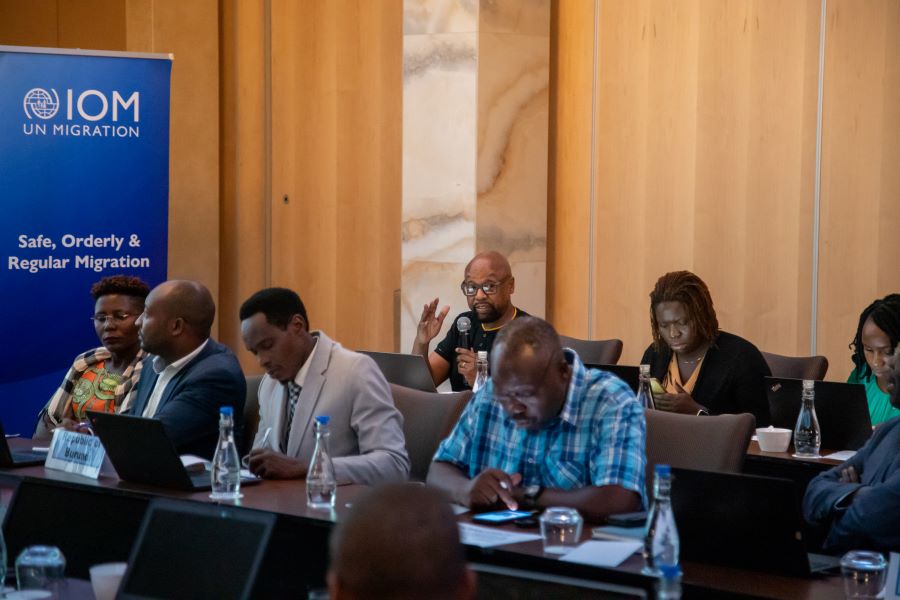
EAC and IOM Partner to Enhance Cross-Border Health Security in the region
East African Community, Arusha, Tanzania, 18th July, 2024: The East African Community (EAC) Secretariat has partnered with the International Organization for Migration (IOM) in an effort to enhance cross-border health security and responses to disease outbreaks in the region.
The partnership will play a critical role in addressing the negative impact of health security issues and disease outbreaks in border areas. The East African region, which is home to more than 300 million people, has been affected by cross-border health security issues and disease outbreaks such as Cholera, Ebola, and the COVID-19 pandemic over the last few years, which have led to the complete breakdown of public health systems in some countries or health systems being completely overwhelmed and unable to cope, among other negative effects.
As part of efforts to address the issue, a workshop has been convened in Zanzibar, Tanzania from 16th - 19th July, 2024 to review the implementation of the EAC Regional Risk and Crisis Communication Strategy (2018/2019 – 2022/2023) in an effort to better inform subsequent cross-border health awareness and improve community engagement initiatives.
“The EAC is committed to having a robust Risk Communication and Community Engagement Strategy to effectively manage and mitigate risks associated with public health emergencies and other health crises,” said Dr. Eric Nzeyimana, the EAC Principal Health Officer.
“There are many lessons to be learnt from COVID-19 and other recent disease outbreaks in our region, like Ebola and Marburg, and these will inform the development of our strategy, that will ultimately facilitate informed decision making to mitigate the effects of health threats,” he added.

The workshop also aims to harmonise various regional Standard Operating Procedures (SOPs) in relation to streamlining risk communication and community engagement. The standardized procedures cover critical communication aspects such as risk communication planning, community engagement methodologies, and cross-border information sharing; while also addressing gender disparities and promoting human rights in health interventions.
"Effective Risk Communication and Community Engagement approaches are essential for managing public health threats and ensuring safe cross-border mobility. By developing inclusive Risk Communication and Community Engagement Standard Operating Procedures, we can foster a more effective response to public health threats across borders in the region to protect the health and well-being of communities along the mobility continuum,” said Viviane Kuissi, IOM’s Regional Migration Health Specialist for the East, Horn and Southern of Africa region.
The harmonised regional guidelines are expected to guide the EAC Partner States in implementing best practices in community-based disease prevention and response at points-of-entry; where there are significant numbers of cross-border interactions. Strengthening Risk Communication and Community Engagement capacity is further expected to build cross-collaboration and trust, address misinformation, and better protect the health of all people in the region, including migrants.

Supported by the IOM Development Fund, the workshop builds upon EAC's Strategic Roadmap for Health Programming at Points of Entry (POEs) and IOM's Health, Border and Mobility Management Framework, which aim to strengthen cross-border health governance, leadership, and coordination.
NOTES TO EDITORS
EAC-IOM Collaboration on Health
The EAC-IOM collaboration aims to strengthen regional health security and ensure safe mobility across borders. By developing harmonized regional Risk Communication and Community Engagement standard procedures, the region is set to improve early detection, management, and containment of public health threats, in the face of epidemic outbreaks that are likely to overwhelm national health systems. This approach aligns with the objectives of the East African Community Common Market Protocol that facilitates free, safe and orderly mobility, trade, and cooperation among EAC Partner States while prioritizing the health, well-being, and rights of migrants for sustainable migration management and the African Union’s Migration Policy Framework for Africa (MPFA).
About IOM Migration Health
IOM’s Migration Health interventions in the East and Horn of Africa region focus on ensuring migrants have access to quality health services and promoting the well-being of mobile populations. Key areas of work include preventing and responding to communicable diseases, supporting mental health and psychosocial assistance, addressing sexual and reproductive health needs, and enhancing preparedness and response to health emergencies and humanitarian crises involving migrants. IOM collaborates with governments, civil society, and other partners to integrate migration health considerations into national health systems and policies, strengthen cross-border health cooperation, and build the capacity of health actors to provide migrant-inclusive services. https://eastandhornofafrica.iom.int/migration-health
For more information, please contact:
Simon Peter Owaka
Senior Public Relations OfficerCorporate Communications and Public Affairs DepartmentEAC SecretariatArusha, TanzaniaTel: +255 768 552087Email: This email address is being protected from spambots. You need JavaScript enabled to view it.
Yvonne Ndege
IOM Regional Communications and Spokesperson for East and Horn of Africa
Email: This email address is being protected from spambots. You need JavaScript enabled to view it.
About the East African Community Secretariat:
The East African Community (EAC) is a regional intergovernmental organisation of eight (8) Partner States, comprising the Republic of Burundi, the Democratic Republic of Congo, the Republic of Kenya, the Republic of Rwanda, the Federal Republic of Somalia, the Republic of South Sudan, the Republic of Uganda and the United Republic of Tanzania, with its headquarters in Arusha, Tanzania. The Federal Republic of Somalia was admitted into the EAC bloc by the Summit of EAC Heads of State on 24th November, 2023 and became a full member on 4th March, 2024.
